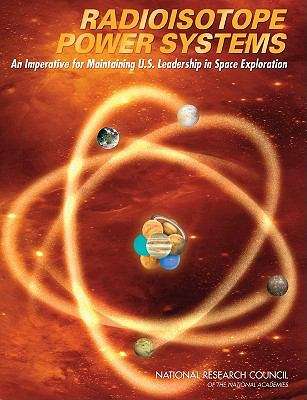Radioisotope Power Systems: An Imperative for Maintaining U.S. Leadership in Space Exploration
By:
Sign Up Now!
Already a Member? Log In
You must be logged into Bookshare to access this title.
Learn about membership options,
or view our freely available titles.
- Synopsis
- Spacecraft require electrical energy. This energy must be available in the outer reaches of the solar system where sunlight is very faint. It must be available through lunar nights that last for 14 days, through long periods of dark and cold at the higher latitudes on Mars, and in high-radiation fields such as those around Jupiter. Radioisotope power systems (RPSs) are the only available power source that can operate unconstrained in these environments for the long periods of time needed to accomplish many missions, and plutonium-238 (238Pu) is the only practical isotope for fueling them. Plutonium-238 does not occur in nature. The committee does not believe that there is any additional 238Pu (or any operational 238Pu production facilities) available anywhere in the world.The total amount of 238Pu available for NASA is fixed, and essentially all of it is already dedicated to support several pending missions--the Mars Science Laboratory, Discovery 12, the Outer Planets Flagship 1 (OPF 1), and (perhaps) a small number of additional missions with a very small demand for 238Pu. If the status quo persists, the United States will not be able to provide RPSs for any subsequent missions.
- Copyright:
- 2009
Book Details
- Book Quality:
- Publisher Quality
- ISBN-13:
- 9780309138574
- Publisher:
- National Academies Press
- Date of Addition:
- 03/07/14
- Copyrighted By:
- the National Academy of Sciences.
- Adult content:
- No
- Language:
- English
- Has Image Descriptions:
- No
- Categories:
- Nonfiction, Science
- Submitted By:
- Bookshare Staff
- Usage Restrictions:
- This is a copyrighted book.
